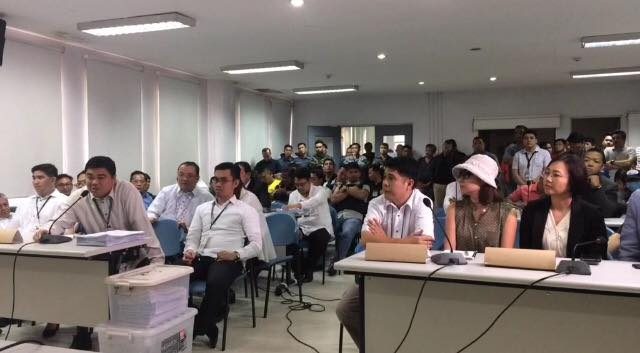SUMMARY
This is AI generated summarization, which may have errors. For context, always refer to the full article.

Last Thursday, March 2, the Department of Justice (DOJ) conducted a one-hour long hearing on the kidnapping-and-murder case of South Korean businessman Jee Ick Joo. Guess what the parties spent more or less 20 minutes on?
They discussed the cost of photocopying and delivering documents, and who would pay for them.
Mario Dionisio of the Public Attorneys Office (PAO), lawyer for prime suspect SPO3 Ricky Sta Isabel, appealed to the panel of prosecutors to no longer furnish copies of his client’s counter-affidavit to the 23 respondents.
Dionisio said: “Our office has very limited resources. And, anyway, the rule states that we are not required to furnish copies to respondents, just complainants. If respondents are interested in the copies, they can photocopy themselves.”
Sta Isabel’s counter-affidavit, which contains around 100 annexes, is 3 inches thick, and Dionisio made repetitive appeals during the hearing to spare the PAO the cost of photocopying them and delivery via courier service.
Bryan Bantillan, lawyer for Jee’s widow Choi Kyung-Jin, implied that Sta Isabel can afford to shoulder the cost, citing revelations at a Senate hearing that the policeman had a net worth of over P20 million at one point.
“Sta Isabel is better off, he has plenty of money. His SALN (Statement of Assets, Liabilities and Net Worth) was presented, he’s way more capable. May I suggest that PAO just photocopy them on the expense of Sta Isabel,” Bantillan said.
Senior Assistant State Prosecutors Juan Pedro Navera and Olivia Torrevillas pushed Bantillan’s comment aside, but also compelled Dionisio to produce copies for all as required.
Dionioso reiterated that Sta Isabel earns only P8,000 a month, and that’s why he qualified as an indigent and a valid client of the public attorney’s services.
PAO lawyers are mandated by law to assist, free of charge, indigent persons in criminal, civil, labor, administrative, and other quasi-judicial cases.
“His net income is P8,000 a month, and the PAO bracket should be less than P14,000 a month. I will present the payslip of Sta Isabel,” Dionisio said.
In his counter-affidavit also submitted to the DOJ on Thursday, Sta Isabel said “humility aside, my wife and I are engaged in several businesses that provide more than enough for me and my family.”
The policeman mentioned in his affidavit some of this businesses, including selling car and personal accident insurance.
Criminal Investigation and Detection Group chief Director Roel Obusan also told a Senate panel that Sta Isabel owns at least 5 houses and lots, a 4-story commercial building, 3 lots in Caloocan City, a Hilux vehicle, a Vios car, and two motorcycles.
Sta Isabel receives a monthly base pay of P25,394, according to data from the PNP, but the policeman said he takes home only P8,000 monthly because of loan deductions.
In a text message to Rappler, PAO Chief Persida Acosta said Sta Isabel’s reported assets belong to his wife and not him. “Individual net income is the basis of the PAO’s income test, not the family income,” Acosta said.
Aside from the submission of counter-affidavits, which respondents subscribed to by taking an oath, the hearing on Thursday revolved mainly on the logistical issue of furnishing copies of documents to parties.
The next hearings will be on March 7 and 10. – Rappler.com
Add a comment
How does this make you feel?
There are no comments yet. Add your comment to start the conversation.